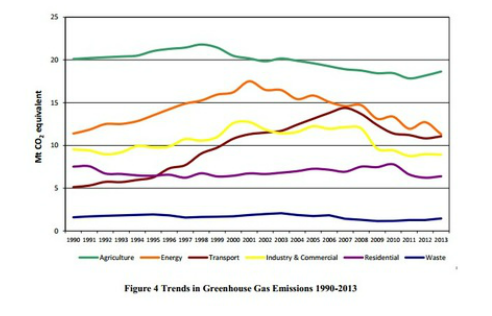 EPA, 2014 - GHG emissions by sector (1990-2013) EPA, 2014 - GHG emissions by sector (1990-2013) Welcome to Climate Friday FAQ #2! Last week, I answered the question, “Why should Ireland take action on climate when the bigger countries aren’t doing anything?” I argued that, despite our small population, Ireland produces a significant amount of greenhouse gases (GHGs) per capita due to our relatively comfortable lifestyle, and I provided evidence to show how bigger countries are already reducing their GHG emissions through investment in renewable energy and other measures. The obvious question that followed was whether or not Ireland was doing anything to reduce our impact on climate in comparison? Those of us involved in climate activism here often complain that Ireland is not doing enough. In policy terms, our last National Climate Change Strategy (2009) expired in 2012 and a new one has yet to be published, leaving government departments in a holding pattern on climate action. Ireland’s climate bill, first proposed in 2007, has still not passed, and it remains to be seen whether or not the climate bill that’s about to be passed will be worth the paper it’s printed on. To make matters worse, the most recent EPA projections indicate we will fail to meet our EU 2020 GHG emission reduction targets and face heavy fines as a result. I’d like to believe that our green island is somewhat “green” in reputation too, and I’d love some good news stories on climate action in Ireland to be proud of. So, let’s forget about inactive governments, failed policies, and EU commitments for a moment and look at the real actions in Ireland that have led to GHG emission reductions over the last 15 years. Have we done anything to reduce our impact on climate change? Energy: The most significant improvement in Irish GHG emissions has been in the energy sector, where carbon dioxide emissions decreased by 36% from 2001-2013 despite over 7% increase in electricity consumption at the same time. How?
Renewable energy penetration is projected to reach 26% by 2020, but while it looks like good news for future GHG emissions reductions in the energy sector, these reductions are partially offset by a projected 19% increase in coal combustion by 2020, continued peat extraction, and by the Department of Communications, Energy and Natural Resources ambition to prioritise oil and gas drilling over the next five years. In the battle between clean and dirty energy, it's still anyone's game... We might be able to pat ourselves on the back for the current emission reductions in our energy sector if we were like the U.S.A, whose majority of emissions come from the “dirty” energy production. However, Ireland is unique - A majority of our emissions come from agriculture (32% in 2014). In the sector where we could make the most difference to our overall GHG emissions, what have we done so far? Agriculture: Agriculture and climate change is a surprisingly contentious issue in Ireland. On one hand, we see farmers as the stewards and protectors of our environment and the people who will be most affected by the impacts of climate change. On the other hand, some see action on climate as an inhibitor to the ambitious growth and production targets set out in the government’s Food Harvest 2020 roadmap. The sector argues that, at best, it can only reduce emissions by 4% while maintaining productivity. While that sounds paltry in comparison to the emission reductions in energy, Irish agricultural emissions peaked in 2007 and are almost back to their 1990 levels. In fact, research indicates that Irish agriculture is more “GHG-efficient” (unit GHGs emitted per unit product) compared to countries in the developing world and within the EU due to our grassland-based farming practices. However, the projections for intensive growth in the agricultural sector don’t bode well for GHG emissions. Without an effective strategy, increased food production leads to increases in fertiliser use, livestock numbers, and energy consumption, all of which lead to increased GHG emissions. There are opportunities for Irish agriculture to be leaders in innovative, cost-effective GHG emission reduction strategies. We’re leading the way in carbon foot-printing on farms through the Bord Bia and Origin Green carbon calculator. At least 90% of our beef farms and almost all of our dairy farms have signed up to their system in an effort to prove their environmental credibility to consumers. However, it remains to be seen whether the sector will turn its strengths in carbon accounting and GHG efficiency into actions on the ground that actually reduce GHG emissions. Some representatives in the agricultural sector argue it’s unfair to expect them to reduce their GHG emissions and that Ireland’s climate commitments should be made in other sectors instead. GHG emissions in transport have more than doubled since 1998 and now comprise 19% of our overall emissions. Despite huge increases in emissions, Ireland’s transport sector has attempted to reduce their emissions through the following measures: Transport:
We made a decent start at tackling transport emissions from 2008, but the emissions trajectory is still rising in the transport sector. Despite interest from all political parties to increase the number of electric vehicles in Ireland by at least 250,000 by 2020, it now looks like we will fall far short of that target with only 50,000 electric vehicles on Irish roads by that time. Based on current policies, our transport emissions are projected to increase a further 23% from 2013-2020. Our government has taken some actions to reduce GHG emissions in the transport, energy, residential, and waste sectors, but has failed to make any efforts to reduce GHG emissions in the largest sector (agriculture) and industry. The result is that, despite our efforts, we’re not going to meet our EU climate commitments for 2020 and we haven’t done anything progressive enough to lead to significant reductions by 2030 or 2050 either. I’ll confess that I wrote this blog as much to evaluate what Ireland has done for myself as I did to inform you. When I read through the list above, I see a case of one step forward, two steps back. We’ve made some progress in the past, but we haven’t done much lately and the political will for action seems to have stalled. Furthermore, the division of emissions into sectors seems to abdicate everyone from making any significant change. It’s easier to just hope another sector will “take the hit” than to do the long-term planning required to transform your own sector. Maybe we need to think beyond sectors and look at solving the problem as a nation. Which brings me to my next "burning question" - Stay tuned next week for Climate Friday FAQ #3, where I'll attempt to find out if there really is a national solution to climate change for Ireland. Keep fighting the good fight! -Cara |


 RSS Feed
RSS Feed